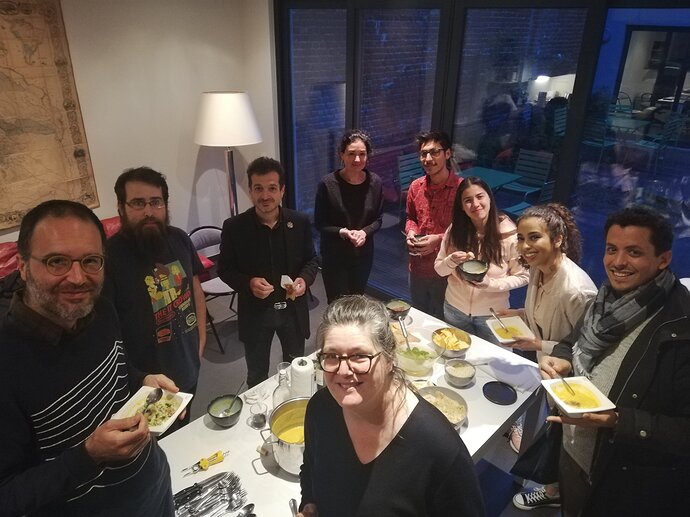Hello all,
The first in the series of culture Culture networked conversations across cities happened in Brussels, with 15 people participating. You are all real urban community experts, massive thanks! Find extensive notes here. The feedback was overall very positive:
‘Good mix of people, nice vibe’
‘ The quandary is that it opened and enormous discussion which made it hard to really focus and therefore the story can become very emotional. So in short, if you have a very precise scope, I’d be delighted to offer some suggestions. If you are interested in developing a project around this, I would be happy to support it. I can also point you in the direct of a number of other people in Brussels and beyond that have a lot of experience on the topic.‘
‘I could not help thinking that a strategic map of Brussels would be very valuable for anyone who wants to build their own space‘ - @alberto here
I would like to think of the time periods: how long is needed to do what? Also legal forms, like cooperatives. - Rob
What have we learned
First, Brussels doesn’t have a public policy for taking on unused spaces. The situation is that strategic deals are being made increasingly via actors who make the promise to give spaces socio-cultural value. While this happens, they extract commercial value out of spaces and communities. Yannick mentioned that legislation is being changed just now in Belgium. It becomes even easier to start a coop (cvba), which could be interesting for the “purchase model” (buying together (see below).
Second, temporary occupations, both long lived and short term, lead to dead ends and precarity for those who use them to make a difference (social housing activism, revitalize industrial spaces, neighborhoods, and so on). They get squeezed out by intermediaries, but at the same time have a hard time growing them and making a strong counter-offer.
There is a need for safer investments. Safety comes with trust, and trust is carried, as always through people. It seems that having someone trusted to manage the deal can offer that. ‘It worked quite well, but then we got a phone call from the company: get out by the end of the week.’ (@Manuel). @ejjjik’s better experience with facilitating a space with private (and generous) ownership in Sofia was very telling.
And anyway, space development and management that is both socially and financially sustainable is hard to achieve. In the words of Yannick reflecting on La Serre, Tournevie, Be-Here: ‘It is important to have a stable source of revenue, to keep the lights on. That means you are free to experiment.’ Events can be good sources of revenues, if you are running a more business oriented space - like Digityser - but they don’t make for in-built sustainability.
What else is there?
The latest Brussels community effort is Commune St Vide-Leegbeek. They are doing tremendous awareness raising through events and site visits. I’ll be speaking to someone involved asap, but if someone has news on the practical ways forward for this initiative please share.
There are at least two other things worth looking into, based on the end of our conversation:
1. What knowledge is out there about taking on spaces without intermediaries? This has been the experience of DoucheFlux, Cinemaximiliaan, Wir Bauen Zukunft.
2. What knowledge is out there about buying together in models of say, fractional ownership? We should be talking to Community Land Trust in Brussels, Timelab, WoonCoop, De Koer in Ghent.
Question to you all: is this something we should be focusing on at the next culture Culture in Brussels? And then making sure there is a good mix of people who could benefit from this knowledge practically. Like @Emmanuel was saying: invite people who want to collectively purchase or do something. Also, let me know if you’d like to help organise it with me and @KatrienR - dates to be confirmed!

